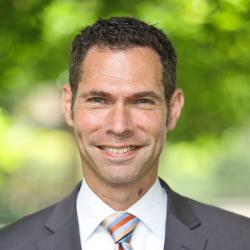For many regions, collaborating on common economic goals—rather than competing against each other for firms and deals—is a major challenge. That struggle is exacerbated in multistate regions like the Washington, D.C., and New York metropolitan areas, where state leaders willing to sign over millions in tax incentives to move jobs across a state border can add another layer of competition.
But few of these divides has been as complicated as the “border war” in Kansas City, which straddles the Missouri and Kansas state lines. In recent years, the two states have allocated more than $200 million in tax incentives to reward businesses for moving jobs across the 14-county region. At the same time, regional economic development groups have themselves often pursued separate—if not conflicting—agendas.
However, distressing economic news has driven the region to jointly address its economic future and make the investments needed to build long-term prosperity.
Twenty years ago, as the headquarters of Sprint and home to AT&T, Kansas City was a center of the rapidly expanding telecommunications industry. But a 2014 report by Brookings and the region’s Mid-America Regional Council showed that the economy had been lagging since the early 2000s, when that industry declined. Growth in output, jobs and wages had slowed significantly from the 1990s. The region’s traded sectors—specialized industries that develop goods and services exported to other markets—had weakened, contributing less to regional growth and faring worse against competitors. On net, Kansas City was losing workers with an associate degree or higher. “Greater Kansas City,” the report cautioned, “stands at a crossroads.”
Facing these trends, three of the region’s major business groups—the Civic Council of Greater Kansas City, the Kansas City Area Development Council and the Mid-America Regional Council—united behind shared goals and a three-part strategy, KC Rising, focused on strengthening the region’s position in trade, innovation and human capital. A year after announcing the strategy, which Brookings has advised, they have made substantial progress in jointly designing and launching key initiatives.
Supporting the Greater Kansas City Chamber of Commerce, a KC Rising partner, the three groups helped develop a plan to boost exports, which includes an “export concierge” service that connects companies region-wide with coordinated export-assistance services. To jumpstart entrepreneurship, partners are launching a $10 million venture capital fund. To maintain the region’s pipeline of skilled workers, a new Talent to Industry Exchange will bring industry and educational leaders together to develop workforce solutions, starting with the region’s life sciences, engineering and architecture industries. Other priorities include working with industry to strengthen the region’s economic clusters, investing in transportation, coordinating science, technology, engineering and math (STEM) offerings and collaborating with the Kauffman Foundation to expand access to postsecondary education and other training credentials.
These targeted initiatives represent important progress toward tackling the region’s economic challenges. They would not have been possible without the civic will to overcome barriers to working toward a common purpose.
Regional collaboration has long been an important, though elusive, hallmark of successful economic development. Leaders in Kansas City are now realizing it is essential to their economic future.
The Civic Council of Greater Kansas City is a member of the Metropolitan Leadership Council, a network of business, civic and philanthropic leaders that acts as a financial and intellectual partner of the Brookings Metropolitan Policy Program.
The Brookings Institution is committed to quality, independence, and impact.
We are supported by a diverse array of funders. In line with our values and policies, each Brookings publication represents the sole views of its author(s).





Commentary
As border war continues, Kansas City region builds a bridge
October 13, 2016